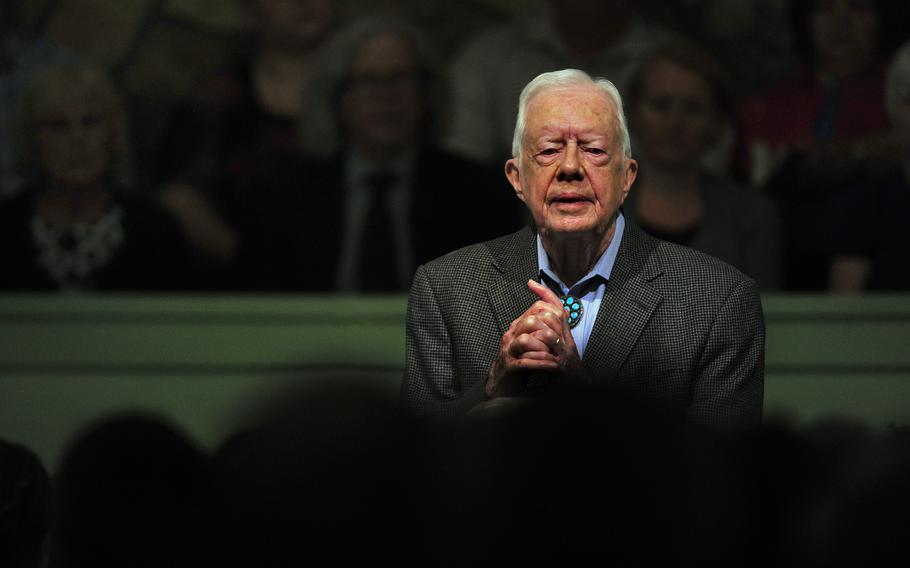U.S.
Former president Jimmy Carter opts for home hospice care for final days
The Washington Post February 19, 2023

President Carter teaches Sunday school at the Maranatha Baptist Church in Plains, Ga. (Michael S. Williamson/The Washington Post)
Jimmy Carter, at 98 the oldest living former president, has chosen to spend his final days at home in Plains, Ga., in hospice care after a series of brief hospital stays, the Carter Center announced Saturday.
Carter “has the full support of his family and his medical team,” the center’s statement said of the decision made by the onetime peanut farmer and engineer who rose to become the 39th U.S. president for one term, from 1977 to 1981.
Carter has overcome serious health problems, including in 2015 when he was diagnosed with melanoma that had spread to his liver and brain. After treatment, doctors said he defied the odds, and Carter announced later that year that he was cancer-free.
Saturday’s announcement from the Atlanta-based Carter Center did not specify whether his cancer had returned or whether another health condition prompted his decision that he was ready for hospice rather than continuing medical care.
Jason Carter, a grandson, wrote on Twitter late Saturday afternoon: “I saw both of my grandparents yesterday. They are at peace and — as always — their home is full of love.” He thanked well-wishers “for all your kind words.”
Friends and others close to the family have said Carter’s health has been in gradual decline in recent months. He now uses a wheelchair to get around, while his wife, Rosalynn, 95, uses a walker. In recent weeks, Carter has asked to get out and about in Plains, and the two have gone for car rides, driven by their Secret Service detail.
Hospice is a form of care for people near the end of life and largely is intended to make patients comfortable and provide support to them and their families once they have chosen to suspend treatment. Hospice typically accepts patients if they are expected to live no more than six months, but some people survive significantly longer.
The announcement by the Carter Center, a nonprofit focused on conflict resolution, democracy and preventing disease, stated that the family “asks for privacy during this time and is grateful for the concern shown by his many admirers.”
The announcement Saturday came 4½ months after Carter celebrated his 98th birthday, including with a parade hosted by his hometown. The weekend before, he and Rosalynn were driven around in a red convertible by a Secret Service agent during Plains’ annual Peanut Festival. Their children, grandchildren and great-grandchildren walked behind the car.
Carter’s tenure in the White House coincided with a difficult period, notably a stagnant economy that included high unemployment and inflation. It was a time of long lines for gasoline, a partial meltdown at the Three Mile Island nuclear plant in Pennsylvania and a siege at the U.S. Embassy in Iran. The 52 hostages held at the embassy were not released until the day Carter relinquished the presidency to the newly elected conservative Republican, Ronald Reagan.
Over time, Carter’s reputation as a president has markedly improved. He has been widely regarded for peace-seeking efforts and other humanitarian work in the decades since he left Washington.
In 2002, he was awarded the Nobel Peace Prize by a selection committee that praised him “for his decades of untiring effort to find peaceful solutions to international conflicts, to advance democracy and human rights, and to promote economic and social development.”
When introducing him as a laureate in Oslo, Gunnar Berge, a member of the Nobel committee, said: “Jimmy Carter will probably not go down in American history as the most effective president. But he is certainly the best ex-president the country ever had.”
Over his post-presidential decades, Carter has built houses for Habitat for Humanity and has worked on various initiatives to resolve conflicts around the world. Since leaving the White House, Carter and his wife of 76 years have led unassuming lives in a house they built in 1961 in the hometown where they met as children.
The former president has already outlived grave health threats. In 2015, Carter disclosed that he had a form of cancer — a melanoma that had spread to parts of his brain. Before current treatments were available, such a diagnosis would have been fatal. By the end of that year, he announced at the start of a Sunday school class he was teaching that his doctors no longer could find any cancer.
“So a lot of people prayed for me,” Carter told his students, “and I appreciate that.”